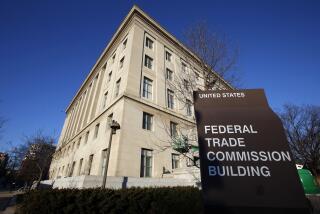SEC Seeks Disclosure of Fund Incentives
- Share via
WASHINGTON — The Securities and Exchange Commission, scrambling to address the latest mutual fund revelations, proposed a rule Wednesday that would require brokers to disclose hidden fees they may get as a reward for pushing particular funds to investors.
The 5-0 SEC vote came just a day after regulators revealed that customers are often left in the dark about the special incentives brokers routinely get from fund companies for recommending their products. Consumer advocates have long urged the SEC to insist on clearer disclosure of these payments and other fees that investors pay when buying funds.
“Investors have the right to clear disclosure of conflicts, fees, expenses and other information,” SEC Chairman William H. Donaldson said. “They also deserve to know how much their broker stands to benefit from their purchase of a particular fund.”
Today, California Treasurer Phil Angelides, New York Atty. Gen. Eliot Spitzer and other state officials plan to announce their own initiative aimed at protecting investors and pensioners from mutual fund abuses.
The SEC on Wednesday also unanimously endorsed proposals to enhance the independence of mutual fund boards of directors, which at many firms have failed to serve as watchdogs against abusive trading practices by insiders.
And the commission proposed that fund managers become subject to ethical codes that, among other things, would require a greater number of employees to report their personal trading.
“No one silver bullet” will solve all the problems in the mutual funds arena, said SEC Commissioner Harvey J. Goldschmid. Rather, he said, “a series of reforms ... will make the critical difference.”
Although the SEC’s disclosure proposal was in the works long before Wednesday, the agency’s report this week of widespread conflicts of interest among brokers greatly heightened interest in the measure.
The agency’s investigation of mutual fund abuses is now focusing on a range of retail practices that would have to be disclosed under the proposal. Practices under scrutiny include deals in which fund firms provide cash or other financial incentives to a brokerage, in return for a prominent perch on the brokerage’s “preferred” list or other preferential treatment, such as access to a brokerage’s top-selling advisors for educational seminars.
Such practices may be legal if sufficiently disclosed, but an SEC investigation of 15 major brokerages found that such disclosure was often lacking.
With the strong backing of Chairman Donaldson, the SEC signaled that it would push quickly toward enacting disclosure requirements. The agency’s proposal would mandate that brokerages explain costs and fees -- possibly over the telephone -- when an investor purchases shares in a fund. In addition, brokerages would have to provide comparative information about costs in the confirmation statement an investor gets after the purchase.
Reaction among investor advocates and the fund industry was mixed.
“This is a major victory for shareholders,” said Mercer Bullard, an advocate for fund investors and a frequent SEC critic. “It incorporates the key disclosures that consumers have been asking for -- and even goes further.”
Such information would create downward pressure on fees, Bullard predicted.
But Don Phillips, a principal at Morningstar Inc., a Chicago-based investment research firm, said he would have preferred that the SEC eliminate certain financial incentives rather than stop at disclosure.
“By going the disclosure route as opposed to taking a harder-line stance, the SEC is leaving itself a huge amount of work on the enforcement side,” Phillips said.
The Securities Industry Assn., which represents brokerage firms, expressed support for the proposals, even though its members could lose money if the new rules reduce fees.
“SIA welcomes these new pro-investor proposals by the SEC,” said Richard Thornbugh, chairman of the association and chief risk officer of Credit Suisse Group, noting that the measures may enhance the confidence of investors.
As for reforming mutual fund management, one series of SEC proposals would enhance the independence of mutual fund boards of directors, requiring that the chairman be independent and that the percentage of independent board members rise to 75% from the current majority.
Independent board members also would be authorized to hire their own staff.
The SEC also proposed a new requirement that investment advisors, who manage mutual funds, establish codes of ethics. Such codes would call for more employees to disclose their own securities transactions, including in the mutual fund they manage. What’s more, they would add safeguards designed to prevent the use of inside information.
Fund companies generally welcomed the proposals, although the Investment Company Institute and some of its members were expected to raise concerns about the independent chairman requirement.
All of the proposals must undergo public comment before a final SEC vote.
Times staff writer Josh Friedman contributed to this report.
More to Read
Inside the business of entertainment
The Wide Shot brings you news, analysis and insights on everything from streaming wars to production — and what it all means for the future.
You may occasionally receive promotional content from the Los Angeles Times.










